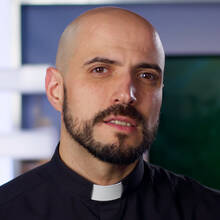A Reflection for the Memorial of St. John Bosco, priest
Find today’s readings here.
“If by the time I turn 30, I am not married yet, I’ll enter the priesthood.”
This is something I distinctly recall telling my grandmother at the start of my twenties while visiting her in Portugal one summer. Whether this conversation actually took place is questionable. Nonetheless, the force of conviction and the sheer vividness with which I remember this exchange has come to be part of my self-narrative around entering training for the priesthood.
Somehow, from the time I said that to one of the dearest people in my life, the idea gnawed at me and never left my mind. It was God’s way of saying, If you’re already open to it, why wait?
And so, God having the wry sense of humor that God does, I entered the Jesuit novitiate two months shy of 24.
I still remember telling my family, friends, colleagues and bosses about my decision. “I’m resigning and it’s an offer you can’t match,” I told my boss, who was convinced he could “beat the offer.”
“I’m becoming a priest,”I told him. An audible gasp followed, and my job in South Africa, he said, “would be waiting for me if it didn’t work out.”The reactions from those closest to me and from my colleagues were similarly incredulous, if always supportive.
Some laughed nervously, while others plowed me with questions trying to piece together this puzzle. Becoming a priest just didn’t fit within their frame of reference for who I was. And it’s strange, but even today—16 years, 4 months and 21 days after joining the Jesuits—some of that incredulity persists, not only in them but also in myself. There is something about our past identities that simply lingers, making it challenging for both us and others to shift long-held perceptions, albeit with a few exceptions, of course.
This is the backstory that comes to mind whenever I’m confronted with the Gospel passage we read today. It is difficult for those who grew up with Jesus and know him intimately to reshape their understanding of who Jesus is and how that changed from the snotty-nosed child that ran around the village, disturbed temple services, regaled elders with his precociousness and escaped notice of his parents for three days. “Where did this man get all this?” the people at the synagogue ask. “Is he not the carpenter”?
The people experience such cognitive dissonance as they attempt to reconcile Jesus, “the son of Mary, and the brother of James and Joseph and Judas and Simon,” with Jesus, the older, wiser man through whose hands mighty deeds have been wrought. Such is their disbelief in this apparent transformation that “he was not able to perform any mighty deed there.”
Now, while my story doesn’t align perfectly with that of Jesus, I’ve experienced significant love and support for my vocation to consecrated religion over the years. Each time I return to the village of my birth in Portugal and the city-neighborhood of my upbringing in South Africa, an embarrassing welcome greets me.
Still, there is an undeniable truth about not quite being able to shake off who I was. I cherish that, in part, because it keeps me humble and allows me to feel normal, just like old times—as one of the guys with the people I shared life with until my early adulthood. On the other hand, my radical and unusual decision still leaves them scratching their heads, unable to fully grasp who I have become and the ways in which I can now serve them differently. As they attempt to make sense of what cannot be made sense of—at least not in any rational, conventional way—I also find myself navigating new truths: being at once a friend or family member and a priest, the same person who once joked with his grandmother before God laughed and did something great with it.








